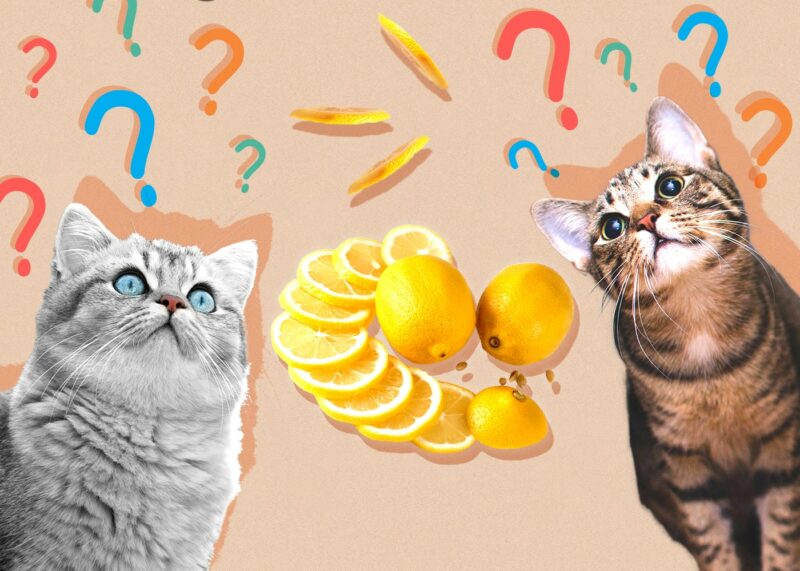If your cat gets into the fruit bowl, you may wonder what you should do. Can cats eat lemons, or are they unhealthy for your furry friends? Unfortunately, lemons are considered toxic to cats. You’ll want to keep them out of the reach of your curious feline.
The good news is that cats usually avoid citrus scents. However, if your cat insists on sampling your groceries, you’ll probably want to know what the specific issues are. Below, we’ll discuss what makes lemon and other citrus fruits a concern for our feline friends.

Toxic Ingredients
What is okay for us to eat isn’t necessarily the same for cats. Garlic, chives, and onions are examples of food we can digest without any issues but will harm other animals.
Unlike people and dogs, cats are carnivores, and most of their diet comes from meat. Evolution hasn’t equipped them to digest plant materials the same as omnivores like us. The problem with lemon or any citrus fruit is an ingredient called psoralen. The compound has therapeutic applications in people for treating health conditions like psoriasis.
For cats, it’s a different story. Psoralen can cause skin irritation, which worsens with contact with UV light and may cause blistering, redness, and dermatitis. Unfortunately, evidence and research around lemon and other citrus fruits and their safety for cats is currently very limited.
The ASPCA lists lemon as toxic to cats, and based on some of the older studies we have found, we would err on the side of caution when it comes to citrus fruits and cats. It’s not the lemons that can cause a problem. The chemical responsible for the lemon scent is also toxic to cats.
The lemon shampoo you use on your dog can be dangerous to use on your cat. That’s why it’s imperative only to use cat products on your pet and make sure they are vet-approved and safe for cats.

The essential oils in lemon and other citric acid products and extracts, which contain limonene and linalool, are also problematic. These compounds are toxic to cats, horses, and dogs in varying degrees. There are a few reports of d-limonene toxicity in cats due to insecticidal shampoos that contain limonene. These signs can be quite severe. The nervous and digestive systems and the skin are usually affected, and there is one report of a cat being euthanized due to the severity of the illness.
Health Effects and Signs
Even a tiny taste of lemon may be enough to trigger gastrointestinal distress in your pet because of the high acidity and essential oil compounds. However, a lot depends on the dose, type of formulation, and health of your cat.
Signs of lemon poisoning in cats may include:
- Irritation around your pet’s mouth and gums
- Drooling
- Depression
- Tremors
- Body weakness
- Loss of coordination
- Falling over
- Lethargy
- Reduced body temperature
- Skin irritation (particularly on the scrotum)
- Skin necrosis (in case of high doses applied on the skin, often through a shampoo)
- Septic shock
Lemon can also cause other signs that may seem odd, such as sensitivity to bright lights or the sun. The cat may cower and act as if they’re in pain. You’ll likely see changes in your pet’s behavior, which indicate something is seriously wrong, and they need to see a vet.

Diagnosis and Treatment
Poisons often act quickly, and the severity of signs depends on how much they eat. Remember that cats often hide the fact that they’re sick. They may act differently than they normally do, like hiding in strange places. That can signal that you’re dealing with illness instead of a toxin, where the effects are more immediate.
If you see the telltale signs, or your cat has eaten part of a lemon or come in contact with citric essential oils or limonene insecticidal shampoo, contact your vet immediately, as you may need to get your cat to the emergency vet hospital ASAP. The typical treatment is to get the toxin out of your pet’s system quickly through gastric lavage or the administration of activated charcoal. The latter will help remove lingering toxins in your cat’s GI tract.
Your vet may also give your pet IV fluids to rehydrate your cat if they vomited or had diarrhea. If they experience phototoxicity or extreme sensitivity to sunlight, you should contact your vet and keep them inside until they fully recover. They may be at risk for secondary skin infections if they lick or scratch too much from the effects.
Learning about what your cat can and cannot eat is a crucial part of keeping them happy and healthy! Choosing a bowl to serve cat-friendly foods in is another important decision pet owners face. Satisfy the specific needs of your cat with the innovative design of the Hepper NomNom Cat Bowl. Learn why it’s our (and our cats!) favorite food and water dish here. At Catster, we’ve admired Hepper for many years and decided to take a controlling ownership interest so that we could benefit from the outstanding designs of this cool cat company!
Final Thoughts
As our discussion showed, lemons are not considered safe for cats and can cause severe and variable signs of toxicity. There are only a few reports on the toxic effects of lemon compounds in cats, particularly in the case of limonene shampoo exposure and essential oils. Speak to your vet if your cat comes in contact with citrus fruits or citric acid products.
The other critical message is that cats and dogs cannot use the same products. They have distinct physiologies that reflect their dietary needs and evolution. A greater risk exists with using canine products on felines. It’s not just marketing by the pet industry. It can have dire consequences. Perhaps the best thing you can do as a pet owner is not to give your cat any people food without speaking to your vet first.












